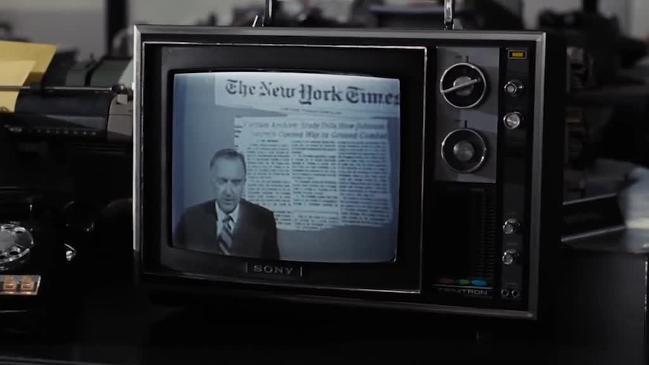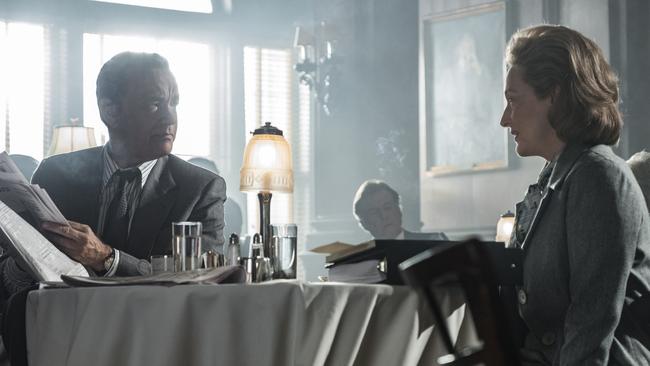The Post is unapologetically political
MAKE no mistake, Steven Spielberg’s latest movie is political. It will leave you in no doubt about exactly what he thinks of President Donald Trump.

THE Post is an unapologetically political movie, designed to be relevant to a 2018 audience despite its Nixon-era setting.
Steven Spielberg has crafted a movie with a strident message about press freedom and unchecked, maniacal power. The Post is an expertly made thriller with a stellar cast that won’t fail to enthral.
It also happens to take place in a tumultuous social period in American political history in which a president tarnished the office he held, leading people to lose faith in their government and its institutions for decades to come. Sound familiar?
The parallel between Nixon and his unfailing drive to control the narrative, and Trump and his complete disregard for the truth is not subtle. But it’s not as though Spielberg intended it to be, especially as the film builds to its somewhat sentimental climax.
In 1971, former military analyst Daniel Ellsberg leaked what came to be known as the Pentagon Papers which became a decisive factor in the eventual withdrawal of American troops from Vietnam.
Ellsberg gave the classified documents to The New York Times and their publication explosively revealed that four successive US administrations had known the likelihood of winning the Vietnam War was slim. But they carried on because they couldn’t face the humiliation of defeat, despite tens of thousands of body bags coming home.

The Post isn’t exactly this story — if you’re looking for a film about that, check out the excellent 2010 documentary, The Most Dangerous Man In America: Daniel Ellsberg And The Pentagon Papers.
Rather, The Post takes place on the periphery of the Pentagon Papers. After The New York Times published its extraordinary reports, The Washington Post’s editor Ben Bradlee (Tom Hanks) was desperate to get his hands on the story.
The New York Times had been prevented by a court injunction served by the Nixon Administration from printing any more of the documents until it could be hashed out in court. So when Bradlee and his team acquire the papers, they have to make the decision over whether they should publish and be damned, potentially facing prison.
The final decision will fall to The Washington Post’s owner and publisher Kay Graham (Meryl Streep) who has to contend with institutional naysayers but also the pressure to balance the paper’s financial prospects in the midst of an IPO.
Graham inherited the paper from her father but not before he had first put her husband in charge. After her husband’s death, Graham has found it difficult to fully grasp the boardroom politics of the publication as the only woman in the room (while a gaggle of female secretaries wait outside, notepad and pen at the ready).
The Post is as much about Graham’s journey of finding the confidence in her voice and instincts, as it is about journalistic integrity and its vital role in a functioning democracy.
In this, Streep is effervescent, embodying the character completely, down to every physical tic and voice modulation. She is the absolute standout in an impressive cast that also includes Bob Odenkirk, Tracy Letts, Sarah Paulson, Bradley Whitford, Matthew Rhys, Carrie Coon and Jesse Plemons.
Unlike All The President’s Men — the excellent film about The Washington Post breaking the Watergate scandal — The Post has not sidelined Graham’s contributions to one of the most influential publications of the latter half of the 20th century.

While Spotlight was the perfect screenplay and performance showcase, that journalism movie lacked an aesthetic pizzazz. The Post, on the other hand, is visually arresting.
You’ve got to give it to an old hand like Spielberg who can make scenes of people arguing in a drab room, or people talking on the phone, seem thrilling. He composes every shot and sequence with an incredible respect to detail. Plus, when he takes you behind the scenes of the printing press, it also makes you miss the feeling of newsprint on your fingers in our digital age.
Where The Post doesn’t quite get there is in the tension. Because the Pentagon Papers is such a well-known story, you feel like you lose a little of the stakes in the movie just because you know how it’s going to end. Try as Spielberg might, that’s not something you can just get around.
But that doesn’t make it any less of a compelling movie. Some of the best scenes are probably between Graham and Bradlee as they talk about the relationship between the press and the powerful institutions that seek to silence it. Graham and Bradlee are both connected to the political establishment and watching them confront their own failings is what makes The Post so watchable.
This is a powerful if sometimes heavy-handed film. It seems particularly significant right now, when there’s an orange buffoon tweeting about awarding “worst news” awards as a propaganda tool to stifle criticism. The Post is Spielberg’s “f**k you” to Trump.
Rating: 3.5/5
The Post is in cinemas from Thursday, January 11.
Share your movies and TV obsessions with @wenleima on Twitter.




